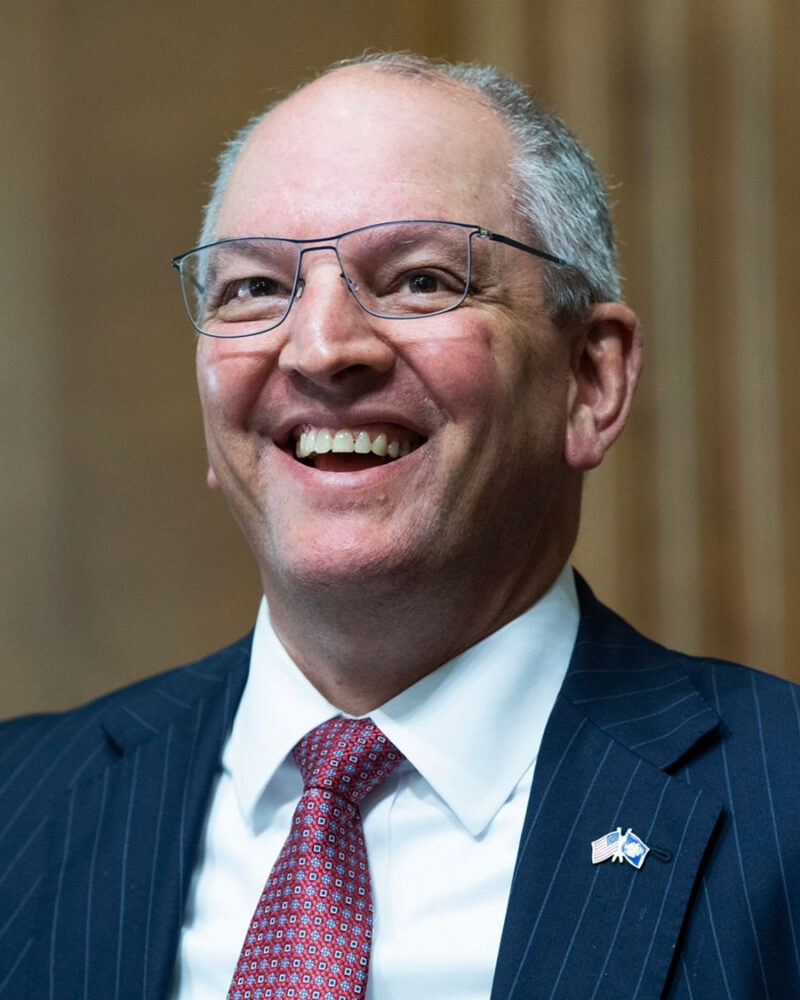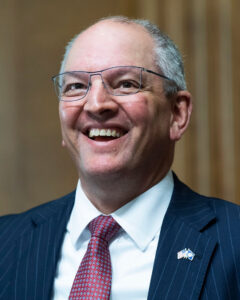John Bel Edwards
John Bel Edwards served as a Democratic governor of Louisiana from 2016 to 2024.

Wikimedia Commons
Governor John Bel Edwards testifying during a Senate Energy and Natural Resources Committee hearing, 2021. Tom Williams, photographer.
John Bel Edwards was elected the 56th governor of Louisiana in 2015, in a heated race featuring three better-known Republicans that ended with Edwards beating two-term US Senator David Vitter. Edwards spent his first term addressing the unstable budget and large deficits left by his predecessor, Republican Governor Bobby Jindal, and fighting major floods in both North and South Louisiana. His second term confronted the challenges of the COVID-19 pandemic and several damaging hurricanes, including Laura and Delta, which ravaged southwestern Louisiana within six weeks of each other in 2020. The only Democrat to win statewide office in the elections of 2015 and 2019, Edwards sparred frequently with Republican majorities in the Louisiana Senate and House of Representatives. Well regarded upon leaving office, Edwards left the state with a budget surplus in marked contrast to his predecessor.
Early Life
Edwards was born in 1966 to a politically minded family in Tangipahoa Parish. He captained the football team at Amite High School and was named valedictorian. Leaving Louisiana, Edwards attended West Point Military Academy in New York, where he earned a degree in engineering. He then served eight years in the US Army as a ranger and commander of a rifle company in the 82nd Airborne Division. After leaving the service, Edwards obtained a law degree from Louisiana State University and returned to Amite to practice law with the family firm, Edwards & Associates.
Political Beginnings and First Term
Edwards ran for the Louisiana House of Representatives in 2007. Although forced into a runoff, he won easily, gaining 66 percent of the votes. Edwards’s leadership potential and military service were recognized in the House, resulting in his appointment to chair the Veterans Committee. Reelected to a second term, Edwards was elected to lead the Democratic Caucus, where he gained attention as a critic of Governor Bobby Jindal’s frequent out-of-state trips and budget woes. Sensing a leadership void and the opportunity provided by an open seat, Edwards announced his candidacy for governor in early 2013, giving him nearly two years to campaign before the October 2015 election. Edwards was not initially a highly regarded candidate. Early polls placed him in the single digits. However, by December 2014, his support rose sharply to 40 percent in the first round of the gubernatorial election. Campaigning on his military service, opposition to abortion, and support for gun rights, Edwards changed the script for Democrats, who were regularly at a disadvantage among the majority of Louisiana voters for supporting abortion rights and gun control. Facing a flood of negative publicity regarding his private life, favorite David Vitter’s support slumped to 23 percent, barely outdistancing the other Republicans in the first round of elections. Buoyed by the endorsements of Republicans Scott Angelle and Jay Dardenne in the runoff against Vitter, Edwards was elected easily with 56 percent of the vote.
Vowing “I will not be a business-as-usual governor,” Edwards began his term facing a budget shortfall of $750 million in 2016, which rose to twice that in the following year. Seeking allies, Edwards was rebuffed by the Republican-majority legislature, which, showing a degree of independence lacking under the Jindal administration, refused to allow the exercise of the governor’s prerogative to name the Speaker of the House and President of the Senate. In response, Edwards called what was to be the first of seven special legislative sessions to place the budget on a sustainable path. His efforts were rewarded with the passing of a one-cent sales tax that eliminated the budget deficit and balanced the state budget. Another significant moment in Edwards’s first term was his decision to expand Medicaid, extending health insurance for previously uninsured Louisiana citizens. In the area of rights, Edwards signed Executive Order No. JBE 2016-11, banning discrimination by the State of Louisiana based on sexual orientation and gender identity. Addressing Louisiana’s status as the prison capital of America, Edwards supported and signed legislation to focus sentencing on violent offenders, redirecting savings toward reducing recidivism.
Edwards’s first term was challenged by flooding in North and South Louisiana and racial tensions reflected in the shooting death of Alton Sterling by the police, which led to mass demonstrations in Baton Rouge and across the state. In addressing these challenges, Edwards was a calm and stabilizing force in the governor’s office.
Second Term
Running for reelection in 2019, Edwards faced two well-funded Republican opponents, Congressman Ralph Abraham and businessman Eddie Rispone. Denied a first-round victory, Edwards prevailed narrowly in the runoff, beating Rispone 51 to 49 percent. As he began his second term, Edwards faced the challenge of COVID-19, which was to sicken more than 1.6 million residents and take the lives of more than nineteen thousand across the state. During the pandemic Edwards engaged in a contentious struggle with the legislature over vaccines, the closing of public schools, and religious liberty. This last struggle, which pitted supporters of civil liberties against proponents of state health measures, was primarily fought along party lines.
Edwards’s reputation for integrity was damaged by the Ronald Green incident, in which state troopers were revealed to have fatally beaten a motorist after a traffic stop and then attempted to cover it up. Reports revealed that Edwards had learned about the issue months before addressing it. As the end of Edwards’s term approached, the legislature overrode his veto of the “Stop Harming Our Kids” bill, which sought to prevent healthcare for transgender children under the age of eighteen. This rare overturning of an Edwards veto was perhaps the final defiant act of a legislature that had often sparred unsuccessfully with Edwards over his years in office. His more than two dozen other vetoes in 2023 remained in place.
Edwards was elected twice as a Democrat in a state trending sharply Republican. His success may be attributed in part to his position on abortion and his embrace of Second Amendment gun rights, which made him more acceptable to conservatives. His legacy is strongest in the areas of budget stability and emergency preparedness.
